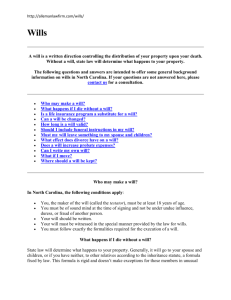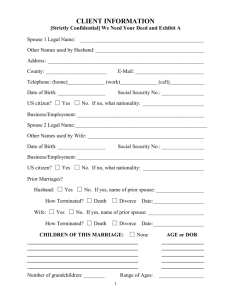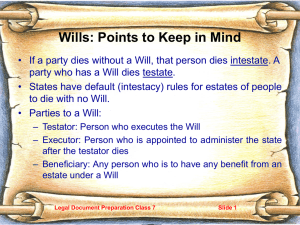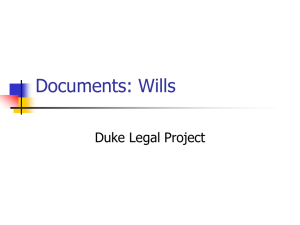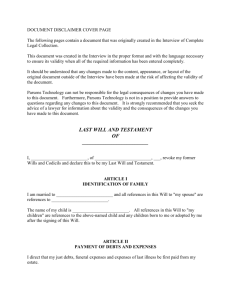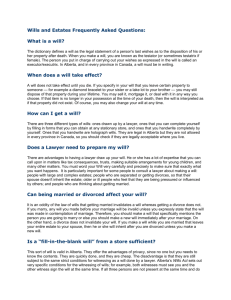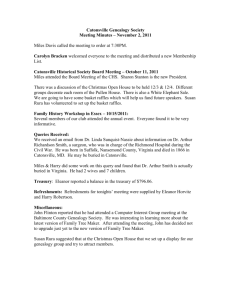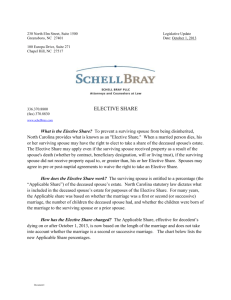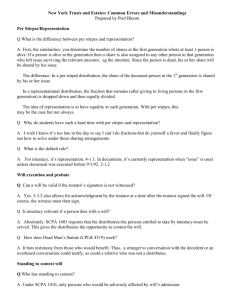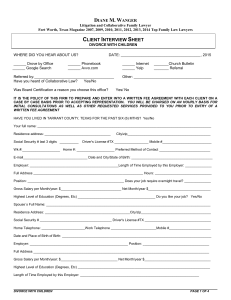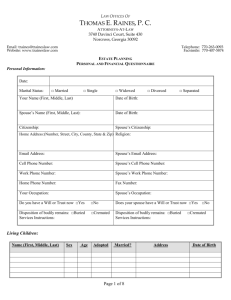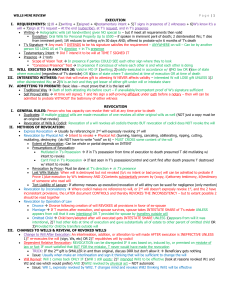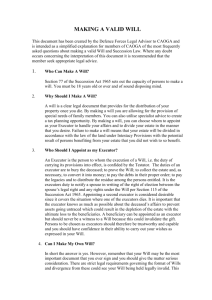Wills.brochure format
advertisement
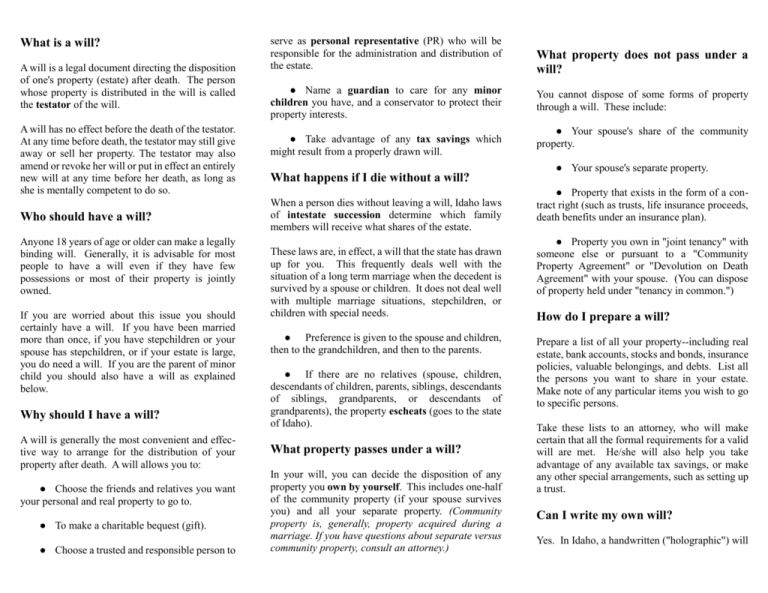
What is a will? A will is a legal document directing the disposition of one's property (estate) after death. The person whose property is distributed in the will is called the testator of the will. A will has no effect before the death of the testator. At any time before death, the testator may still give away or sell her property. The testator may also amend or revoke her will or put in effect an entirely new will at any time before her death, as long as she is mentally competent to do so. Who should have a will? Anyone 18 years of age or older can make a legally binding will. Generally, it is advisable for most people to have a will even if they have few possessions or most of their property is jointly owned. If you are worried about this issue you should certainly have a will. If you have been married more than once, if you have stepchildren or your spouse has stepchildren, or if your estate is large, you do need a will. If you are the parent of minor child you should also have a will as explained below. Why should I have a will? A will is generally the most convenient and effective way to arrange for the distribution of your property after death. A will allows you to: ● Choose the friends and relatives you want your personal and real property to go to. ● To make a charitable bequest (gift). ● Choose a trusted and responsible person to serve as personal representative (PR) who will be responsible for the administration and distribution of the estate. ● Name a guardian to care for any minor children you have, and a conservator to protect their property interests. ● Take advantage of any tax savings which might result from a properly drawn will. What happens if I die without a will? When a person dies without leaving a will, Idaho laws of intestate succession determine which family members will receive what shares of the estate. These laws are, in effect, a will that the state has drawn up for you. This frequently deals well with the situation of a long term marriage when the decedent is survived by a spouse or children. It does not deal well with multiple marriage situations, stepchildren, or children with special needs. ● Preference is given to the spouse and children, then to the grandchildren, and then to the parents. ● If there are no relatives (spouse, children, descendants of children, parents, siblings, descendants of siblings, grandparents, or descendants of grandparents), the property escheats (goes to the state of Idaho). What property passes under a will? In your will, you can decide the disposition of any property you own by yourself. This includes one-half of the community property (if your spouse survives you) and all your separate property. (Community property is, generally, property acquired during a marriage. If you have questions about separate versus community property, consult an attorney.) What property does not pass under a will? You cannot dispose of some forms of property through a will. These include: ● Your spouse's share of the community property. ● Your spouse's separate property. ● Property that exists in the form of a contract right (such as trusts, life insurance proceeds, death benefits under an insurance plan). ● Property you own in "joint tenancy" with someone else or pursuant to a "Community Property Agreement" or "Devolution on Death Agreement" with your spouse. (You can dispose of property held under "tenancy in common.") How do I prepare a will? Prepare a list of all your property--including real estate, bank accounts, stocks and bonds, insurance policies, valuable belongings, and debts. List all the persons you want to share in your estate. Make note of any particular items you wish to go to specific persons. Take these lists to an attorney, who will make certain that all the formal requirements for a valid will are met. He/she will also help you take advantage of any available tax savings, or make any other special arrangements, such as setting up a trust. Can I write my own will? Yes. In Idaho, a handwritten ("holographic") will ● You have or adopt children. is valid, so long as all the important provisions are in your handwriting. You must also sign the will. ● Any beneficiaries die or become incompetent. If you have a complex or large estate (over $200,000) or if you have any doubts about how to write a holographic will see an attorney. Wills are not expensive to draft and the mistakes you can make can be very costly. How can I change my will? You can change your will at any time before your death. ● You can write a new will to replace the old one. It should be dated and state "I hereby revoke all prior wills and codicils." ● You can also revoke any old will by destroying it with the intent to revoke. Be sure you also destroy all copies. ● You can change just a part of your will by executing a "codicil." A codicil is an addition to a will that may change a particular gift or add a beneficiary. It must be executed with the same formality as a will. It should also be titled as a codicil, signed, and should identify the will it is supplementing. It should be signed by two witnesses. If you do want to change your will, see the attorney who helped you prepare it. When should I change my will? You may wish to update your will if, after the will is written: ● You get married, remarried, or divorced. ● You acquire new property or sell a major item mentioned in your will. ● The tax laws are substantially changed. It is good to review your will once a year to make sure it still reflects your wishes. Idaho Legal Aid Services, Inc. Area Offices 1447 S. Tyrell Lane, Boise. . . . . . . . . . . . . . . . 345-0106 1104 Blaine, Caldwell . . . . . . . . . . . . . . . . . . . 454-2591 610 W Hubbard, Suite 219, Coeur d’Alene . . . 667-9559 482 Constitution Way, Suite 101, Idaho Falls . 524-3660 633 Main Street, Lewiston . . . . . . . . . . . . . . . . 743-1556 150 S. Arthur, Pocatello . . . . . . . . . . . . . . . . . . 233-0079 475 Polk, Twin Falls . . . . . . . . . . . . . . . . . . . . . 734-7024 Idaho Senior Legal Hotline . . . . . . . . . . . 1-866-345-0106 Idaho Senior Legal Hotline (Spanish-speaking) . . . . . . . . . . . . . . . . . . . . . . . . . . 1-866-954-2591 Domestic Violence Legal Advice Line . . . . 1-877-500-2980 9/15 Questions And Answers About: Wills
